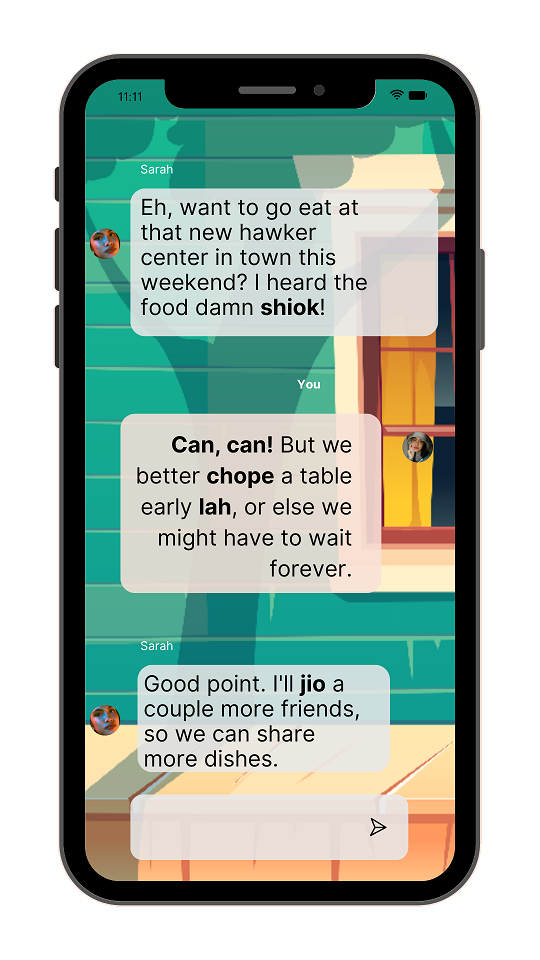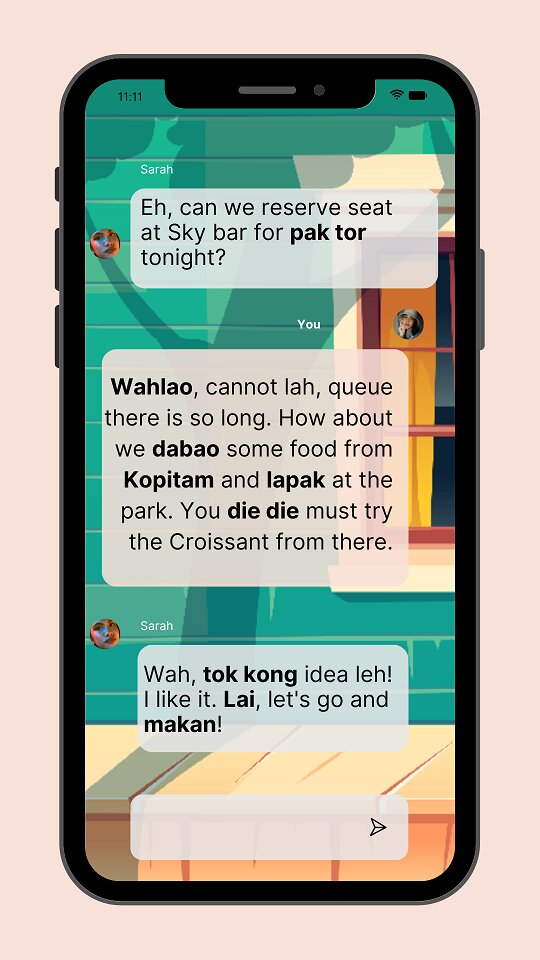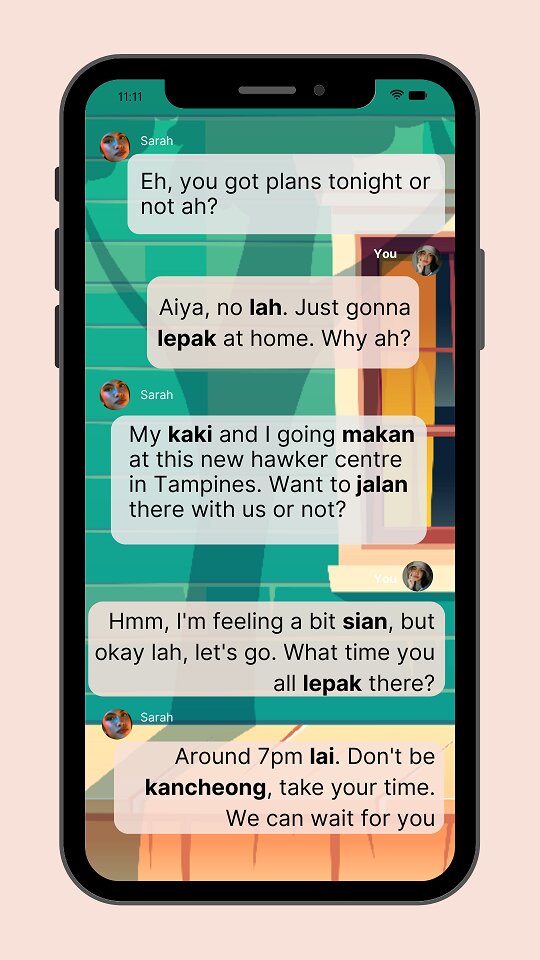As you gear up for your exciting adventure in Singapore, it’s crucial to familiarize yourself with the local lingo: Singlish. This unique language fuses English, Malay, Hokkien, and Tamil, resulting in a linguistic tapestry that’s both fascinating and challenging to master.
But fear not, as learning some Singlish phrases and words can help you immerse yourself in the local culture and make meaningful connections with the people you meet. Our blog is your guide to the essential Singlish terms that you simply can’t do without during your stay in Singapore.
From quirky phrases that locals love to use, to tantalizing food terms that will make your taste buds sing, we’ve got you covered. So, get ready to explore the rich linguistic landscape of Singlish and dive into the cultural melting pot that is Singapore!
Singlish 101: A Beginner’s Guide to Local Lingo
But, Before jumping into the crash Course in Singlish, let me explain a Singlish term that many foreigners might hear while visiting Singapore, especially Caucasian tourists. You may have heard people using the term “Ang Moh” to refer to people of European descent and wondered what it means.
But don’t worry, the term is derived from the Hokkien dialect and means “red-haired” or “red-skin.” It’s not meant to be offensive (at least not in most cases), but it’s important to understand the context in which it’s being used.
In general, “Ang Moh” is a friendly and neutral term to refer to people of European descent or foreigners with lighter skin. You might even hear it used in a lighthearted and joking way, so don’t be surprised if someone calls you “Ang Moh” with a smile.
However, it’s also important to understand that some foreigners might find the term offensive. That’s why many young Singaporeans try to avoid using the word altogether and prefer to use the term “Westerners” to refer to people from Europe, North America, or Australia.
At the end of the day, it’s all about understanding the cultural context and respecting each other’s differences. So, don’t get too worked up about the term “Ang Moh” and enjoy your time in Singapore!
1) Lah – Origin: Malay
The usage of the word “Lah” in Singaporean English is ubiquitous, serving various functions at the end of a sentence such as emphasizing a point, confirming an idea or soliciting a request. The word’s versatility is evident in the range of emotions it conveys, from the exasperation of frustration to the urgency of necessity and even the fervor of enthusiasm. Furthermore, in the context of communication in Singapore and Malaysia, “Lah” carries an undertone of casualness and familiarity, often employed to add a gentle touch to a request or soften the impact of a forceful statement.
Examples: Here are some examples of how “lah” is used in Singaporean English:
“Don’t be late, lah!” (Emphasis)
“I’m so tired, lah. (Emphasis)
“So we’re meeting at 7 pm at the hawker center, lah?” (Seeking confirmation)
“Let’s go for dinner, lah.” (Suggestion)
“Can you pass me the salt, lah?” (Softening a Request)
“Help me carry this box, lah?” (Casual Request)
“I told you to finish your homework already, why are you still playing games lah!” (Conveying frustration)
“Hurry up and finish your breakfast, lah! We’re already late for the meeting.” (Conveying urgency)
“Let’s go shopping, lah! I heard there’s a big sale at the mall.” (Conveying enthusiasm)
“Oh sure, you can just show up two hours late, no problem lah.” (Conveying Sarcasm)
2) Shiok – Origin: Malay
“Shiok” is a vibrant and expressive Singaporean term that conveys a deep sense of pleasure, satisfaction, or enjoyment. The word finds its origin in the Malay language, where it means “delicious” or “pleasurable.” In the context of Singaporean English, “shiok” is often employed to describe a variety of positive experiences or sensations, such as the sheer joy of savoring a delectable meal or the relaxing feeling of receiving a soothing massage.
Beyond that, the term can also be used as an expression of admiration or approval for something remarkable or exciting, such as a captivating performance or event. As an exclamation, “shiok” serves as a vivid way to convey surprise, amazement, or appreciation for something truly exceptional. Interestingly, the Oxford English Dictionary (OED) recognized the significance of “shiok” in March 2016, adding it to their lexicon as an adjective that describes delicious or superb food and as an interjection used to express admiration or approval, similar to “cool!” or “great!”
Examples: Here are some examples of how “Shiok” is used in Singaporean English:
“This laksa is so shiok! The spiciness and richness of the broth is just perfect.”
“Wow, you just did a triple backflip off the diving board? That was shiok!”
“I went to a concert last night and it was so shiok! The music was amazing and the energy in the crowd was electric.”
“After a long week at work, it’s so shiok to just kick back and relax on the couch with a good movie.”
“I just got a really shiok massage at the spa. It was so relaxing and rejuvenating.”
“The view from the top of the mountain was simply shiok. The scenery was breathtaking.”
“I can’t believe I just finished a 10K run. It was tough, but the feeling of accomplishment afterwards was so shiok.”
“I just tried this new restaurant and the food was so shiok. I’m definitely coming back here again.”
3) Chope – Origin: Malay
In Singapore, the word “chope” is commonly used to indicate the act of reserving a table or seat in a food court or hawker center by placing an object like a tissue packet, bag pack or umbrella on it. This term has its roots in the Malay language, where the word “cap” means to stamp or mark. Over time, the word was adopted into Singaporean English and transformed into “chope,” which now signifies the act of reserving or claiming a spot.
Chope culture is common in Singapore’s food scene. It helps diners secure tables, especially during peak hours. It is pronounced as “chohp” with a short “o” sound, similar to the word “hop” with a “ch” sound at the beginning. The stress is on the first syllable, so it is pronounced as “CHOHP”.
Examples: Here are some examples of how Singlish word “Chope” is used in IRL:
“The hawker center is so crowded, I need to chope a table fast!”
“I’m going to chope the table with my umbrella so no one takes it.”
“Can you chope the seat next to you for me?”
“We need to chope a table quickly before the lunchtime rush.”
“Don’t forget to chope our spot in line for the food stall.”
“She chope-d the best seat in the house with her book.”
“I saw someone chope the table with their phone.”
4) Jio and Bo-Jio – Origin: Hokkien
Another commonly used Singlish word among family, and friends in Singapore, is “jio”, which basically means to invite someone to do something together. You can say “Jio me out!” to invite your friends to hang out with you.
Now, if someone leaves you out and didn’t invite you to join them, that’s called “bo-jio”. It’s like saying “Wow, I see how it is. You didn’t invite me? Bo-jio lah.” The word “jio” actually comes from Hokkien, a Chinese dialect commonly spoken here in Singapore. In Hokkien, “jio” means “to call” or “to invite”, while the word “bo” in “bo-jio” is Hokkien dialect for “no” or “not”. So, if you want to use it like a local, try saying “Eh, come jio me watch movie lah!” or “Next time jio me lah, don’t bo-jio!”
Examples: Here are some examples of how Singlish word “Jio” and “Bo-Jio” is used in IRL:
“Don’t forget to jio me if you’re going to the concert.”
“If you’re planning to go shopping this weekend, jio me also ah!”
“Don’t jio me anymore, I’m tired of going out every weekend.”
“Why didn’t you jio me to the party last night?”
“Let’s jio John and his girlfriend for dinner tonight.”
“I can’t believe you guys went bungee jumping last weekend and didn’t tell me. Bo jio!”
“I can’t believe they all went to the beach without me, bo-jio lah.”
“Everyone’s going to the club tonight, but nobody jioed me. Bo-jio again.”
5) Can – Origin: English
“Can” is a versatile word that has a variety of uses in Singaporean English. At its most basic, “can” means “yes” or “okay”, as in “Can lah, let’s go to the hawker centre.” but this can also be used with various Singlish modifiers. Here are some examples of its other uses:
“Can lor” – This is used to agree to something or to say “okay”. For example, “You want to meet at 2 pm?” “Can lor.”
“Can or not?” – This is a question asking for confirmation or agreement, similar to “is that okay?”. For example, “Can we meet at 7 pm?” “Can or not?”
“Sure can” – This means “definitely yes” or “for sure”. For example, “Can you come to my birthday party?” “Sure can!”
“Can meh?” – This is a question asking for confirmation or expressing doubt like “How sure are you”. For example, “You finished all your homework already?” “Can meh?”
“Can liao” – This means “it’s done” or “it’s ready”. For example, “Is the food ready?” “Can liao.”
“Can already” – This means “it’s already done” or “it’s already okay”. For example, “Can you pass me the salt?” “Can already.”
“Can one la” – This means “it’s Easy” or “it’s possible”. For example, “Can we go to the beach tomorrow?” “Can one la.”
“Can ah?” – This is a question asking for agreement or confirmation like “can this be done”. For example, “Let’s go to the mall?” “Can ah?”
“Can hor” – This is a question asking for confirmation or agreement, similar to “You Sure?” For example, “Can we meet at 8 pm?” “Can hor?”
Here’s an example of these 5 Essential Singlish Words in an informal conversation between two friends:

6) Tok Kong – Origin: Hokkien
When visiting Singapore, you might hear “tok kong”, a Hokkien phrase for exceptional things or people. The term is derived from “dǎng kōng”, which means “reaching for the sky”. To say it right, emphasize the second syllable and pronounce “tohk” and “kOng” with short and long “o” sounds, respectively.
Examples: Below are some real-life examples of how the Singlish term “Tok Kong” is used:
“This durian is tok kong, you must try it!” – Referring to a high-quality and delicious durian fruit.
“The performance last night was tok kong, the dancers were amazing!” – Describing an exceptional and impressive dance performance.
“I love this car, it’s so tok kong, the engine is so powerful.” – Praising the high-quality and impressive performance of a car.
“My uncle is tok kong at cooking, his laksa is the best in the neighbourhood.” – Describing someone’s exceptional culinary skills.
“This hotel is tok kong, it has a beautiful rooftop pool with a stunning view.” – Referring to a hotel that offers luxurious and impressive amenities.
7) Pak Tor – Orign: Cantonese
The term “pak tor” is commonly used in casual conversations among young people in Singapore. The word originates from Cantonese where it means “hitched together”. In Singlish, it refers to the act of dating or going out on a date with someone.
Examples:
“Do you have any pak tor ideas for Valentine’s Day?”
“I love the episode where Chandler and Monica finally decide to pak tor.”
“We’ve been pak tor-ing for six months now.”
“I’m nervous about my first pak tor date.”
“Did you hear that Amanda and Mark are pak tor-ing now?”
8) See How and So How? – Origin: English
The Singlish term “see how” is often used as a way to suggest a plan of action, with an implied sense of uncertainty or contingency. It can be used to mean “let’s wait and see,” or “Let’s see how it goes.”
Example:
A: Can you finish this project by Friday? B: See how lah, I’ll try my best.
A: Do you think it will rain later? B: See how lor, the weather can be unpredictable.
“So How” is often used as a way to ask for clarification or to check someone’s understanding. It can be used to mean “what do you think?” or “what we gonna do about it?”
Example:
“So how, want to go eat prata or what?”
“So how, what time you want to meet later?”
“I heard your boss was pretty angry yesterday, so how?”
“You said you were going to help me move house, so how?”
A: I heard you got a new job, congratulations! B: Yes, so how, I’m excited to start.
9) Wahlao – Origin: Hokkien
Wahlao” is an exclamation that is often used to express surprise, shock, or disbelief in Singapore. The term is derived from the Hokkien phrase “wa li ao”, which loosely translates to “Oh my goodness.”
Example:
“Wahlao, this queue so long ah!”
“Wahlao, this weather so hot lah!”
“Wahlao, why your room so messy?”
Wahlao, why you never tell me earlier?
Wah lao eh, this food is damn shiok leh!
10) Die-Die – Origin: English
Native English-speaking nationals may think the phrase “die-die” is referring to the act of dying. However, in Singlish, this expression is utilized to emphasize the significance or assurance of something, conveying the idea of trying at all costs.
Example:
“I die die must get this job” means “I absolutely have to get this job no matter what”.
“You die die must try the chili crab at Jumbo Seafood, it’s the best in Singapore!”
“I die die must have the report by tomorrow” means “I absolutely must have the report by tomorrow”
11) Dabao – Origin: Mandarin
In Singapore, it’s very common to use the term “Dabao” (also spelt as “Tapao”) when referring to food that one wants to take away. This term, which is uniquely Singaporean-Chinese, is borrowed from the Mandarin hanyu pinyin language. “Da” in Mandarin means to hit/make/gather, while “Bao” means to wrap.
Example:
“Can you dabao me a chicken rice from the hawker center for lunch?”
“Could you dabao me some noodles for dinner later?”
“Let’s dabao some bubble tea on the way home.”
“I’m too tired to cook tonight, let’s dabao some food from the nearby restaurant.”

12) Singlish terms related to Local Food
- Kopitiam – Origin: Hokkien. Example: “Let’s go to the kopitiam for breakfast.” implies a local coffee shop, Café, or eatery.
- Kopi-O – Pronounced ‘ko-peeh oh’ means Black coffee with sugar
- Kopi O kosong – Pronounced “ko-peeh oh coh-soh-ung” means Black coffee without sugar.
- Kopi peng – Pronounced “ko-peeh peh-eng” means Iced coffee with condensed milk.
- Teh tarik – Origin: Malay. Example: “I love drinking teh tarik at the kopitiam.” implies a popular beverage made from black tea blended with condensed milk, which is pulled between two cups to froth it.
- Mee siam – Origin: Malay. Example: “I’m craving some mee siam for lunch.” implies a spicy vermicelli noodle dish.
- Mee rebus – Origin: Malay. Example: “I prefer mee rebus over mee siam.” implies a boiled yellow noodle dish in a spicy gravy.
- Nasi lemak – Origin: Malay. Example: “I could eat nasi lemak for breakfast, lunch, and dinner.” implies an aromatic rice dish cooked in coconut milk, pandan leaves and some other herbs.
- Roti prata – Origin: Indian. Example: “I like my roti prata with curry.” implies a flatbread served with curry.
- Goreng pisang – Origin: Bahasa Malay. Example: “I love snacking on goreng pisang, especially on a rainy day.” Implies a deep-fried battered bananas.
- Tahu goreng – Origin: Malay. Example: “Let’s order some tahu goreng as a snack.” implies a deep-fried tofu dish.
13) Singlish terms Locals love to Use
- Jalan – Origin: Malay. Example: “I’m going to jalan jalan around town today.” implies going for a leisurely walk or stroll.
- Kaki – Singlish term “kaki” is borrowed from the Teochew language and is commonly used to refer to friends, buddies, or mates.
- Kiasu – Origin: Hokkien. Example: “Don’t be so kiasu about everything.” implies being overly competitive or afraid to lose out.
- Kancheong – Origin: Hokkien. Example: “She’s so kancheong about the exam.” implies being anxious or nervous.
- Lai – Origin: Hokkien. Example: “Lai, let’s take a photo together.” implies an invitation or suggestion to do something.
- Lepak – Origin: Malay. Example: “Let’s just lepak at the park this weekend.” implies hanging out or chilling.
- Makan – Origin: Malay. Example: “What’s good to makan around here?” implies eating or food.
- Paiseh – Origin: Hokkien. Example: “I’m so paiseh for being late.” implies feeling embarrassed or sorry.
- Sian – Origin: Hokkien. Example: “I’m feeling sian about work today.” implies feeling bored or uninterested.
- Sabo – Origin: Malay. Example: “Why did you sabo me in front of the boss?” implies sabotaging or betraying someone.
- Siao – Origin: Hokkien. Example: “Why are you so siao about the new phone release?” implies being crazy or obsessed with something.
- Siam – Origin: Thai. Example: “I need to siam the office politics.” implies avoiding or steering clear of something.

Hope these essential Singlish terms will help you fit right in! – se la mat jalan (Good bye !!)

